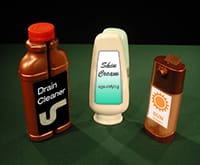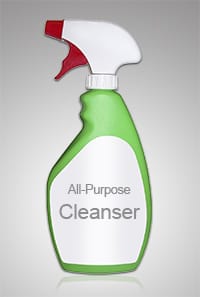Dispensing & Specialty Packages


Consumer products such as liquid detergents, healthcare and beauty products, are frequently packaged in squeeze dispensers. A squeeze-dispense package typically consists of a flexible bottle and an orifice or nozzle-type closure. Squeezing the bottle dispenses the product.
As product is dispensed, the headspace is occupied by air. The air/liquid interaction in the package influences dispensing characteristics. As the headspace occupied by air increases, the squeezing force required to dispense the same amount of fluid also increases. This is due to the nonlinear changes in dispensing characteristics brought about by the changing effective stiffness of the package as the fluid level decreases.
The effort required to dispense product versus product flow rate plays a key role in customer satisfaction. The consumer develops a “feel” for product flow rate versus dispensing effort required based on initial interactions when the package is full. A significant change in this feel as the product is depleted can be perceived as unsatisfactory package and/or product performance.
It is desirable to maintain a consistent relationship between product flow versus squeezing effort during the entire usage of the product. Hence, it is essential to evaluate package performance considering effort versus product flow rate. This can be achieved by testing various packages with various products. This approach can be expensive and tedious. A computer model to explore this aspect can provide an environment for rapid virtual prototyping.
Co-Dispensing Packaging
Regardless of whether you are pouring, pumping or spraying, Stress Engineering can help you design a co-dispensing package. We have expertise in the design and simulation of a broad range of novel product delivery systems. These include:
- Dual-dispensing devices
- On-demand mixing
- Motor-actuated delivery
- Powder delivery systems
- Thermally-driven dispensers
- Ultrasonic systems
- Devices using piezoelectric components and smart materials
Stress Engineering uses the latest in computer-aided design technology to power its design-by-analysis approach. This includes computational fluid dynamic (CFD) simulation of flow-through devices, finite-element (FE) modeling of seals and snap fits, and moldflow simulation to support design of injection-molded parts. Dual dispensing systems often benefit from the development of custom-written software which allows us and our clients to quickly assess the impact of a wide range of design choices.
We back up our analytical expertise with solid experience and practical testing. Whether it is flow-rate testing, force to dispense measurement, seal integrity assessment, environmental degradation studies, or basic viscosity, rheology, and strength testing, we have the custom laboratory facilities necessary to support successful dispenser design.
Pumps And Sprayers
Pumps and sprayers is an arena where Stress Engineering frequently works behind the scene with clients to provide physics-based modeling and analysis. Regardless of whether an off-the-shelf pump or sprayer is used or a new proprietary design is developed, our services will save you significant time and money.
We develop “system models” which allow you to predict key aspects of dispensing performance as a function of fluid rheology, pump/sprayer design, and consumer behavior. In most cases the deliverable for these projects is a validated, predictive model that clients can use to assess the performance of a system, evaluate the effects of variability and conduct “what-if” studies to explore the bounds of acceptable performance.



